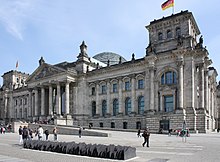Otto Gerig
Otto Gerig (born June 9, 1885 in Rosenberg (Baden) ; † October 3, 1944 in Buchenwald concentration camp ) was a German trade unionist and politician ( center ).
Life and work
Otto Gerig was born as the third of ten children to a main teacher and organist. After graduating from secondary school in 1899, he took an advanced training course at the Technical University of Karlsruhe and completed an apprenticeship as an insurance salesman, which he completed with the examination for clerks. He then worked for various insurance companies. A job at Basler Versicherung finally led him to Cologne .
From 1907 Gerig was a member of the German National Handicrafts Association (DHV), where he initially volunteered. Later he was a full-time board member of the DHV and from 1921 to 1922 was DHV-Gau leader of the Lower Rhine - Westphalia district in Essen . In addition, Gerig was a member of the board of the Christian direction association of the DHV and acted as a managing board member in the umbrella organization of the German trade union federation in Berlin .
Gerig took part in the First World War as a soldier and received several military awards before he was withdrawn from the front line.
After his marriage to Hanna Degenhardt on May 10, 1924 in Potsdam , he and his family settled in Cologne-Deutz .
Political persecution under National Socialism
When the National Socialists came to power, Gerig began a period of political persecution. In the DC circuit of the unions in the German Labor Front , he was released on 25 June 1933, a slight severance from the DHV and lost the right to his legally guaranteed pension. Gerig was considered politically unreliable and was barred from working in other associations. A planned emigration to Brazil failed. Gerig tried unsuccessfully to run a grocery store, so that the family ran into economic hardship. He was briefly supported and employed by the municipal welfare office in Cologne. On July 25, 1937, Gerig found a job as a businessman at the Ford factory in Cologne . After a one-month probationary period, he was threatened with dismissal due to political unreliability; but then he was kept busy. The German bank brought Gerig suspected that he was responsible for a hidden party assets, which in Amsterdam was created bank. Gerig remained politically unadjusted and suspicious because he remained connected to the church, had secret links with opposition members and refused to make a statement about a change of political heart.
During the "Grid" campaign , Gerig was arrested along with other former members of the Reichstag and politicians from democratic parties (including Konrad Adenauer , Josef Baumhoff , Peter Schlack , Joseph Roth and Peter Paffenholz ). He was arrested on August 23, 1944, one day later taken to the Cologne Gestapo prison EL-DE-Haus and transferred from there as a protective prisoner to the labor education camp in the exhibition halls in Cologne-Deutz. During this time his wife, Hanna Gerig , tried to get him free. On September 16, 1944, Gerig was transferred to the Buchenwald concentration camp together with Baumhoff, Roth and Schlack . They were placed in cell block 45. He died there a short time later. His concentration camp number was 81614.
MP
Gerig had been a member of the Center Party since 1913 , was a member of the Prussian Landtag from 1921 to 1924 and was a member of the Reichstag from 1923 to 1933 .
Honors
- In 1970, a street in Cologne-Deutz was named in honor of Gerig at the suggestion of the CDU parliamentary group in the Cologne council. Since 1992 one of the 96 memorial plaques for members of the Reichstag murdered by the National Socialists has been commemorating Gerig in Berlin near the Reichstag .
- In 1999 the Catholic Church accepted Otto Gerig as a witness of faith in the German martyrology of the 20th century .
literature
- Helmut Moll , (Ed. On behalf of the German Bishops' Conference), Witnesses for Christ. Das deutsche Martyrologium des 20. Jahrhundert , Paderborn et al. 1999, 7th revised and updated edition 2019, ISBN 978-3-506-78012-6 , Volume I, pp. 375–378.
- Helmut Moll: Martyrdom and Truth. Witnesses of Christ in the 20th century . Weilheim-Bierbronnen 2005; 6th edition 2017, ISBN 3-928273-74-4 .
- Reimund Haas: Otto Gerig. In: Biographisch-Bibliographisches Kirchenlexikon (BBKL). Volume 19, Bautz, Nordhausen 2001, ISBN 3-88309-089-1 , Sp. 530-537.
- Eckhard Hansen, Florian Tennstedt (Eds.) U. a .: Biographical lexicon on the history of German social policy from 1871 to 1945 . Volume 2: Social politicians in the Weimar Republic and during National Socialism 1919 to 1945. Kassel University Press, Kassel 2018, ISBN 978-3-7376-0474-1 , p. 57 f. ( Online , PDF; 3.9 MB).
Web links
- Literature by and about Otto Gerig in the catalog of the German National Library
- Otto Gerig in the database of members of the Reichstag
- Otto Gerig in the online version of the Reich Chancellery Files Edition . Weimar Republic
Individual evidence
- ↑ Internationales Rotes Kreuz Bad Arolsen, Archive: Excerpt from the block relocations of the Buchenwald concentration camp, relocations on September 29, 1944 from the tent camp, sheet 659
| personal data | |
|---|---|
| SURNAME | Gerig, Otto |
| BRIEF DESCRIPTION | German trade unionists and politicians (center), MdR |
| DATE OF BIRTH | June 9, 1885 |
| PLACE OF BIRTH | Rosenberg (Baden) |
| DATE OF DEATH | October 3, 1944 |
| Place of death | Buchenwald concentration camp |

